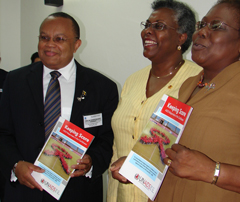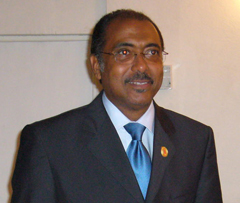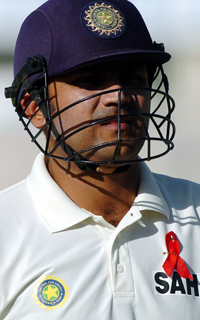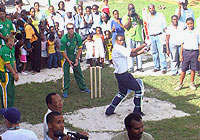 South African cricket team fielding coach
South African cricket team fielding coach
Jonty Rhodes (left) and wicketkeeper AB de
Villiers (centre) watch a young cricketer hit.
The cricket team visited the Dorothy Bailey
Health Centre in Georgetown, Guyana.
Phot credit:UNICEF/Wilson“Every wicket counts in cricket, and it’s the same with the fight against AIDS - everybody’s contribution makes a difference.” These were the words of the UNAIDS Country Coordinator for Guyana and Suriname, Dr. Ruben del Prado, speaking during a visit by members of the South African cricket team to the Dorothy Bailey Youth Health Centre in Georgetown, Guyana.
After their close victory over Sri Lanka in the Super 8 stage of the ICC Cricket World Cup 2007, the South African team decided to take some time off and show their support for the health centre and its initiatives for young people living with HIV, the first of its kind in Guyana.
Using teamwork to defeat AIDS
Led by Minister of Health Dr. Leslie Ramsammy, UNICEF Guyana Representative Johannes Wedenig and Dr. del Prado, the cricket team was escorted into a crowded hall full of schoolchildren and other guests. Under banners calling people to “Unite for Children, Unite against AIDS”, two local schoolchildren, Murisa and Darren, welcomed everyone and spoke of the need to fight against the spread of the HIV.
Dr. Ramsammy told the assembly that HIV and AIDS was a global problem. “We are all in this together and AIDS can only be beaten if we work as a team,” he remarked.
Mr. Wedenig said it was heartening to see the peoples of South Africa and Guyana joining hands in a common cause. “Knowledge is power,” said Mr. Wedenig. “By empowering children with knowledge to protect themselves, we can win.”
Speaking on behalf of the South African cricketers, the team’s fielding coach, Jonty Rhodes, said that as well-known sportsmen they had the opportunity to highlight global challenges facing society. “ South Africa has a high prevalence of HIV,” he said, and the national cricket team is “committed to doing all we can to raise awareness about HIV, and fight the stigma and discrimination that surround it”.
Through an informal question and answer session with the participating young people and media, the world-famous right-handed batsman reiterated the importance of knowledge, teamwork and endurance in order to successfully fight HIV; similar to the skills needed for winning a cricket match.
Realizing dreams
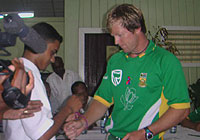 Saud, a Guyanese student, ties a Band of
Saud, a Guyanese student, ties a Band of
Commitment on the wrist of Jonty Rhodes,
the South African cricket team’s fielding
coach at the Dorothy Bailey Health Centre
in Georgetown, Guyana.
Phot credit:UNICEF/WilsonIn a solemn moment, Mr. Rhodes and a Guyanese student, Saud, tied Bands of Commitment on each other’s wrists, as all present pledged to protect themselves and each other against HIV.
South African star bowler, Shaun Pollock, spoke of his three-year-old daughter, “She has dreams just like other kids,” he said. “I need to make sure that she can realize her dreams.”
After the formal ceremony, the visitors toured Dorothy Bailey Health Centre before everyone went outside to play cricket. On a bumpy grass-and-sand wicket next to the centre, Mr. Pollock lobbed soft balls to Minister of Health Dr. Ramsammy, who played a secure, straight bat before being caught in the slips.
The event was one of many taking place across the region on the occasion of the World Cup organized by the partnership between the International Cricket Council (ICC), UNICEF, UNAIIDS and the Caribbean Broadcast Media Partnership on HIV/AIDS, to highlight the situation of children and young people living with and affected by HIV.
This story first appeared on the special ICC Cricket World Cup section of the Unite for Children Unite against AIDS web site – uniteforchildren.org
Links:
Read “Cricket World Cup raises AIDS awareness"
For more information on the AIDS activities around the Cricket World Cup and to access the public service announcements please visit the following links:
Special page on Cricket World Cup International Cricket Council
Live Up Campaign Caribbean Broadcast Media Partnership on HIV/AIDS




